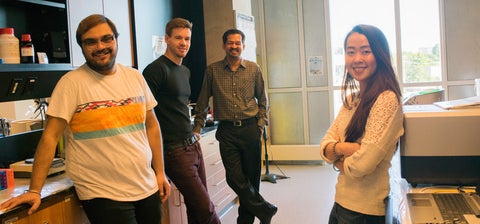
Sarbjeet, Jonathan, Dr Nekkar and Amy, the newest member of the team, in their lab. Absent: Arash.
Nearly 44 million people worldwide live with Alzheimer’s disease. As Canadians are living longer, caregivers and those with Alzheimer’s are relying on treatment to be able to continue living independently.
Associate Professor Praveen Nekkar Rao and his Medicinal and Bioorganic Chemistry Lab at the Waterloo School of Pharmacy are helping to expand treatment for those affected by Alzheimer’s. Dr. Nekkar recently received an Ontario Research Infrastructure Award, which the government officially announced in August 2016. He discussed how his lab will use the funding:
“With this NMR infrastructure funding, our lab will be able to conduct rapid high-through-put screening and characterization of small molecule compound libraries in-house as well as train student users."
Developing New Treatment Methods
At the government’s announcement of the funding, University of Waterloo President Feridun Hamdullahpur also expressed his appreciation:
This announcement will support infrastructure and help early-career researchers build exceptional teams to continue to lead the advancement of transformational research.
Dr. Nekkar’s team of Master’s and PhD students is exactly this kind of exceptional team. United by a common interest in combatting Alzheimer’s, they have focused on different ways that treatment for the disease can be improved, often working in collaboration with Dr. Nekkar orwith each other.
As a testament to the productivity of Dr. Nekkar’s team, all of his lab members had posters accepted for the Alzheimer’s Association International Conference, the largest Alzheimer’s conference in the world. Their research demonstrates the way that their work is collaborative, building from similar concepts and methodological approaches:
- Tarek Mohamed: Alzheimer’s treatments often involve a ‘one drug, one target’ approach where a single drug is intended to fix a single problem. Tarek’s research is instead multi-targeted: he developed strategies for developing treatments that target various facets of the disease all at once. Read more about Tarek’s ‘two birds, one stone’ approach.
- Arash Shakeri: To address some of the root causes of Alzheimer’s, Arash is developing small molecules based on cage compounds. The molecules are designed to target two toxic proteins in the brain called beta-amyloid that stick together and block cell-to-cell signals.
- Sarbjeet Gujral: Like Tarek, Sarbjeet’s research explores how to design compounds that can target multiple factors associated with Alzheimer’s. His research involves the development of novel tricyclic compounds which have the potential to hit those multiple targets.
- Jonathan Sutley: Like Arash, Jonathan designed a class of molecules to combat amyloid proteins that build-up in the brain and would otherwise result in cognitive decline. Based on a tricyclic system similar to Sarbjeet’s research, Jonathan’s designed molecules can scavenge toxic free radicals and can provide neuroprotection.
Congratulations to Dr. Nekkar and his team!